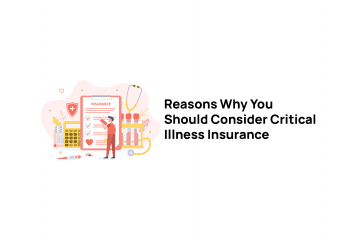In This Article
- What is Critical Illness Insurance and how does it work?
- Who Needs Critical Illness Insurance?
- What Diseases does Critical Illness Insurance Cover?
- How Much does Critical Illness Insurance Cost?
- The Benefits of Critical Illness Insurance
- Critical Illness Insurance vs Disability Insurance
- What Are the Different Types of Critical Illness Insurance?
- Is Critical Illness Insurance Worth It?
If you insure your home, your car, and your life, should you also be insuring your health? In Canada, it is estimated that two out of five people will be diagnosed with cancer in their lifetimes and every year over 50,000 people suffer from strokes. That’s not to mention many other critical illnesses that impact our lives or the lives of our loved ones. Fortunately, thanks to advances in healthcare, chances of survival and recovery from these serious diseases are always improving. Still, a critical illness diagnosis can upturn your life and your finances.
That’s where critical illness insurance comes in. This type of coverage provides a living benefit should you be diagnosed with a potentially life-threatening condition, providing an extra financial safety net. In this article, we’ll take you through how critical illness insurance works, what its benefits are, and if it’s the right type of coverage for you.
What is Critical Illness Insurance and how does it work?
Critical illness insurance is a valuable form of insurance designed to provide financial support to people in the event of a life-changing medical diagnosis. In short, if you have critical illness insurance coverage and are diagnosed with a covered medical condition (such as cancer or stroke), the insurance provider will pay you a lump sum, tax-free benefit. This money can be used at your discretion, whether it’s to pay for private medical treatments, to cover bills or lost income, or to fund anything else you may need.
If you are diagnosed with a critical illness that is covered in your policy, you have to file a claim with your insurance provider. The claims process requires medical documentation that proves your diagnosis was made by an authorized physician or medical specialist. It is worth noting that most insurance providers will only issue the benefit 30 days after diagnosis. This waiting period is also known as a “survival period”. Additionally, many critical illness insurance policies include clauses that stipulate when coverage begins after the policy has been activated. For example, some critical illness insurance providers will not pay the benefit if the insured is diagnosed with cancer in the first 90 days of the policy. If the claim is approved, you will receive the benefit as a single, tax-free payment.
Similar to term life insurance, critical illness insurance coverage is bought for a certain length of time, usually in 10-year chunks. If you buy a 10-year term for your critical illness insurance, you can also choose to have your premium rate locked in for the duration of the coverage. It is also important to know that many critical illness policies continue even after you’ve made a claim and received a benefit. This means that even if you’ve been diagnosed with a covered illness and have received a benefit, if you are diagnosed with another illness later on (unrelated to the first diagnosis) you will be eligible for another claim.
Like life insurance, it is a good idea to invest in a critical illness insurance policy when you are in good health and young. This is when policy premiums will be their lowest. This will also ensure you are eligible for the most coverage without any exclusions. If you are in the market for critical illness insurance, it is often offered by life insurance companies as a companion to life insurance and disability insurance policies, however it is also available as a standalone personal policy.

Who Needs Critical Illness Insurance?
Across Canada, we are fortunate to have fairly broad healthcare coverage through provincial programs. But while we can rest assured that we will be treated by doctors if we are diagnosed with any medical problem, there are gaps in Canadian healthcare coverage, including certain treatments, prescriptions, and follow-up home care. Moreover, medicare doesn’t provide financial support for other aspects of your life that can be impacted by a serious diagnosis, like time off work.
Critical illness insurance therefore provides an important financial safety net that enables people to focus on their treatment and health without having to worry about money and how they’re going to pay the bills. That being said, not everyone needs critical illness insurance to the same degree.
For example, if you have a long-term career with an employer that provides benefits like long-term disability insurance, you may not need critical illness insurance because your income will be secure even if you have to take significant time off work. Some employers even offer critical illness insurance as part of their group benefits. Another scenario in which critical illness insurance may not be as important is if you have a healthy emergency fund, which could cover any added expenses incurred from a critical illness diagnosis.
Critical illness insurance is therefore most vital for people that don’t have employee benefits and whose income would be impacted by a serious medical diagnosis. If you are self-employed, for instance, a cancer diagnosis and subsequent treatment could severely affect your ability to work and earn income. A lump sum benefit can therefore allow you to focus on your health without stressing about how to make ends meet.
What Diseases does Critical Illness Insurance Cover?
Critical illness insurance policies typically cover up to 25 different conditions. Usually, the more conditions are included in a policy, the higher the premium costs. Across the board, the most commonly covered diagnoses are cancer, stroke, and heart attacks. Other conditions that are usually included are Alzheimer’s, Parkinson’s, multiple sclerosis, paralysis, coma, kidney failure, bacterial meningitis, blindness, deafness, severe burn injuries, loss of limb and others.
There are also a range of health conditions that are not covered by critical illness insurance, including chronic health issues like diabetes or asthma. Most critical illness insurance policies will also exclude pre-existing conditions. Depending on the policy, however, people who have previously been diagnosed with a critical illness but have recovered may be able to find coverage if their good health has been maintained for a certain length of time. Self-inflicted injuries or illness related to the intentional use of drugs or intoxicants are also typically excluded from critical illness insurance coverage.
Be sure to shop around for different critical illness insurance policies and pay particular attention to what is covered and what is excluded. For instance, some policies will only pay a benefit if certain types or stages of cancer have been diagnosed.
Get a free quote
How Much does Critical Illness Insurance Cost?
Like any type of insurance, the cost of critical illness premiums depends on how much coverage you need and how long the coverage period is. Other factors, like your age and health will also influence how much you will pay, as will the number of covered illnesses.
In terms of the size of policy, there is no single right answer. If you aren’t sure how much coverage you might need, it may be helpful to know that many people choose to purchase a policy with a benefit the equivalent of one year of income. If you are diagnosed with a critical health condition, receiving this amount of money as a tax-free lump sum will allow you to take extended time off work for treatment and recovery, while still covering all necessary bills and providing for your dependents.
Age is also an important factor in determining critical illness insurance costs, for the simple fact that as you age your risk of being diagnosed with an illness increases substantially. A critical illness insurance policy with benefit of $25,000 can cost as little as $7/month if you are under the age of 30. At the age of 50, the same policy will cost you closer to $27/month. At SunLife Financial, one of Canada’s leading insurance providers, a 10-year term policy worth $100,000 costs on average $32/month for a 35-year-old non-smoker.
The Benefits of Critical Illness Insurance
- Claim simplicity: Filing a claim and receiving a benefit for critical illness insurance is straightforward. Once your medical provider sends proof of diagnosis to your insurance provider, a claim is initiated. If approved, you will receive a tax-free lump sum payment.
- No restrictions on how money is spent: The benefit issued through critical illness insurance can be used 100% at the discretion of the policy holder. You can choose to spend the money on private treatment, to pay of debt, as income replacement, to travel, anything.
- Return of premium rider: Many critical illness insurance providers provide the option of return of premiums. This means that if you never make a claim, the insurance company will reimburse the premiums you paid when the policy expires. This option has higher premiums than traditional critical illness insurance.
- Renewable and convertible options: Most critical illness insurance policies include a renewability and convertibility clause, which allows policy holders to either renew or convert their coverage when their initial term ends.
- Highly customizable policies: Policy holders have the option to customize many aspects of their critical illness insurance policy, including the length of the coverage, the size of the policy, and the number of covered illnesses (up to a maximum of about 25 conditions).

Critical Illness Insurance vs Disability Insurance
Critical illness insurance and disability insurance share some things in common—for instance, they both provide financial support if you become critically ill or suffer a serious injury—but there are also some important differences between the two.
As we’ve seen, critical illness insurance pays a one-time lump sum to policy holders if they are diagnosed with a serious health condition that is covered. Disability insurance, on the other hand, provides a monthly payment if you lose the ability to work due to injury or illness. Traditionally, disability insurance payments are equivalent to up to 70% of your regular monthly income and continue until you regain the ability to work.
Because disability insurance is tied to the ability to work, only people who are employed are eligible to apply for this type of insurance. The coverage amounts are also proportional to how much you earn. For instance, if you make $6,000 a month, you would be eligible for up to $4,200 a month in benefits—70%. With critical illness insurance, anyone can apply for coverage regardless of whether they are currently employed. The coverage amount is also chosen by the policy applicant.
Another notable difference is that while critical illness insurance has a waiting period of 30 days before a benefit is issued, many disability insurance policies only kick in if you’ve already been off work for between 30 and 120 days. With both types of insurance, the benefit is only paid if your specific condition or illness is covered by the policy.
What Are the Different Types of Critical Illness Insurance?
When shopping for critical illness insurance, keep in mind that there are different types of coverage out there. Some critical illness policies are available on a term-by-term basis. For example, you can buy a 10-, 20- or 30-year term critical illness policy. The shorter the term, the cheaper the policy’s premiums will be.
Those looking for longer term coverage can also opt to purchase critical illness insurance policies that provide coverage until a certain age, like 65, 75 or 100. If you do choose one of these more “permanent” policies, many insurance providers will also offer you the option of a “return of premium” rider. With this rider, you can be entitled to a full reimbursement of your premiums if you haven’t made a claim in the first 15 years of your policy. Adding this rider increases the policy’s premium rates substantially.
Is Critical Illness Insurance Worth It?
In many cases yes, critical illness insurance is worth it, especially if you don’t have extensive disability or illness benefits through your work. Though it is hard to predict if or when you will be diagnosed with a life-changing disease or medical condition, critical illness insurance provides peace of mind that if it should happen, you will have some financial cushioning to soften the blow. A critical insurance benefit can give you greater freedom when choosing courses of treatment, it can provide income replacement if you need to take time off work, it can help pay for modifications to your home if you have lost any mobility, or be used in any way you see fit.
If you need more information about critical illness insurance or are on the hunt for the right policy for your needs, book an appointment to chat with one of our insurance advisors.




